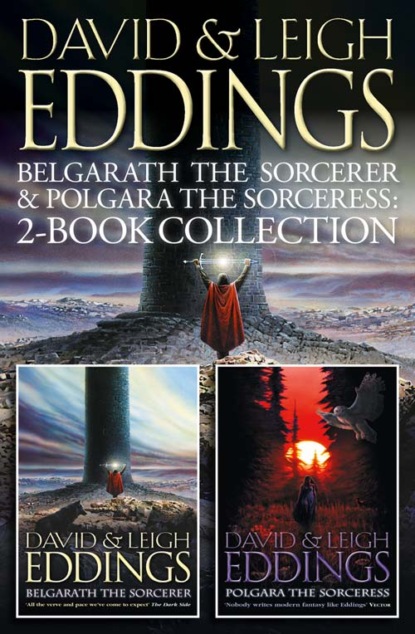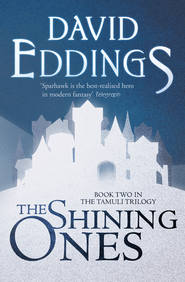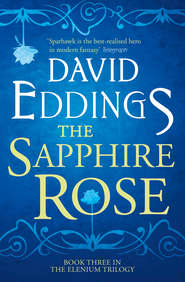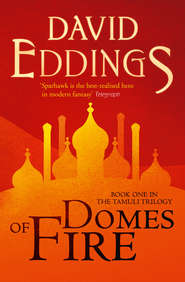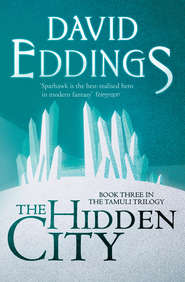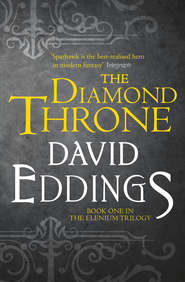По всем вопросам обращайтесь на: info@litportal.ru
(©) 2003-2025.
✖
Belgarath the Sorcerer and Polgara the Sorceress: 2-Book Collection
Автор
Год написания книги
2019
Настройки чтения
Размер шрифта
Высота строк
Поля
‘I wouldn’t want to spoil it for you. Come along.’
We trooped through the halls from the royal apartment to the Hall of the Rivan King, and the two guards who were always there opened the massive doors for us.
I’d been in Riva’s throne room before, of course, but the size of the place always surprised me just a bit. It was vaulted, naturally. You can’t really support a flat roof safely over a room of that size. Massive beams criss crossed high overhead, and they were held in place by carved wooden buttresses. There were three great stone firepits set at intervals in the floor, and a broad aisle that led down to the basalt throne. Riva’s sword hung point-down on the wall behind the throne, and the Orb resting on the pommel was flickering slightly. I’m told that it did that whenever Riva entered the hall.
We marched on down to the throne. ‘Take down your sword, Iron-grip,’ I said.
‘Why?’
‘It’s a ceremony, Riva,’ I told him. ‘Take down the sword, hold it by the blade, and introduce your son to the Orb.’
‘It’s only a rock, Belgarath. It doesn’t care what his name is.’
‘I think you might be surprised.’
He shrugged. ‘If you say so.’ He reached up and took hold of the huge blade. Then he lifted down the great sword and held the pommel out to the baby in Polgara’s arms. ‘This is my son, Daran,’ he said to the Orb. ‘He’ll take care of you after I’m gone.’
I might have said it differently, but Riva Iron-grip was a plain-spoken sort of fellow who didn’t set much store in ceremonies. I immediately recognized the derivation of my grandson’s name, and I was sure that Beldaran would be pleased.
I’m almost certain that the infant Daran had been asleep in his aunt’s arms, but something seemed to wake him up. His eyes opened, and he saw my Master’s Orb, which his father was holding out to him. It’s easy to say that a baby will reach out for any bright thing that’s offered to him, but Daran knew exactly what he was supposed to do. He’d known about that before he was even born.
He reached out that small, marked hand and firmly laid it palm-down on the Orb.
The Orb recognized him immediately. It burst joyously into bright blue flame, a blue aura surrounded Pol and the baby, and the sound of millions of exulting voices seemed to echo down from the stars.
I have it on the very best of authority that the sound brought Torak howling to his feet in Ashaba, half a world away.
Chapter 25 (#ulink_b33964c7-6460-55c7-b112-898e48a81e6f)
Pol and I stayed on the Isle of the Winds for about a month after Daran was born. There wasn’t anything urgent calling us back to the Vale, and it was a rather special time in our lives. Beldaran was up and about in a few days, and she and Pol spent most of their time together. I don’t think I’d fully understood how painful their separation had been for both of them. Every now and then, I’d catch a glimpse of Polgara’s face in an unguarded moment. Her expression was one of obscure pain. Beldaran had inexorably been drawn away from her – first by her husband and now by her baby. Their lives had diverged, and there was nothing either of them could do about it.
Algar Fleet-foot left for Vo Wacune after a week or so to have a talk with the Wacite Duke. Evidently, the idea which had come to him in that mountain pass had set fire to his imagination, and he really wanted to explore the possibility of establishing a permanent cattle-fair at Murnos. Raising cows has its satisfactions, I suppose, but getting rid of them after you’ve raised them is something else. If I’d paid closer attention to the implications of his notion, I might have realized just how profoundly it would affect history. Revenues from that fair financed the military adventures of the Wacites during the Arendish civil wars, and the profits to be made in Muros almost guaranteed a Tolnedran presence there. Ultimately, I suppose, that cattle-fair was responsible for the founding of the Kingdom of Sendaria. I’ve always felt that an economic theory of history is an oversimplification, but in this case it had a certain validity.
Meanwhile, I hovered on the outskirts of my little family waiting for the chance to get my hands on my grandson. You have no idea of how difficult that was. He was Beldaran’s first child, and she treated him like a new appendage. When she wasn’t holding him, Polgara was. Then it was Riva’s turn. Then it was time for Beldaran to feed him again. They passed him around like a group of children playing with a ball, and there wasn’t room for another player in their little game.
I was finally obliged to take steps. I waited until the middle of the night, crept into the nursery, and lifted Daran out of his cradle. Then I crept out again. All grandparents have strong feelings about their grandchildren, but my motives went a little further than a simple desire to get all gooey inside. Daran was the direct result of certain instructions my Master had given me, and I needed to be alone with him for a few minutes to find out if I’d done it right.
I carried him out into the sitting room where a single candle burned, held him on my lap, and looked directly into those sleepy eyes. ‘It’s nothing really all that important,’ I murmured to him. I refuse to babble gibberish to a baby. I think it’s insulting. I was very careful about what I did, of course. A baby’s mind is extremely malleable, and I didn’t want to damage my grandson. I probed quite gently, lightly brushing my fingertips – figuratively speaking – across the edges of his awareness. The merger of my family with Riva’s was supposed to produce someone very important, and I needed to know something about Daran’s potential.
I wasn’t disappointed. His mind was unformed, but it was very quick. I think he realized in a vague sort of way what I was doing, and he smiled at me. I suppressed an urge to shout with glee. He was going to work out just fine. ‘We’ll get to know each other better later on,’ I told him. ‘I just thought I ought to say hello.’ Then I took him back to the nursery and tucked him into his cradle.
He watched me a lot after that, and he always giggled when I winked at him. Riva and Beldaran thought that was adorable. Polgara, however, didn’t. ‘What did you do to that baby?’ she demanded when she caught me alone in the hall after supper one evening.
‘I just introduced myself, Pol,’ I replied as inoffensively as possible.
‘Oh, really?’
‘You’ve got a suspicious mind, Polgara,’ I told her. ‘I am the boy’s grandfather, after all. It’s only natural for him to like me.’
‘Why does he laugh when he looks at you, then?’
‘Because I’m a very funny fellow, I suppose. Hadn’t you ever noticed that?’
She glowered at me, but I hadn’t left her any openings. It was one of the few times I ever managed to out-maneuver her. I’m rather proud of it, actually. ‘I’m going to watch you very closely, old man,’ she warned.
‘Feel free, Pol. Maybe if I do something funny enough, I’ll even be able to get a smile out of you.’ Then I patted her fondly on the cheek and went off down the hall, whistling a little tune.
Pol and I left the Isle a few weeks later. Anrak sailed us across the Sea of the Winds to that deeply indented bay that lies just to the west of Lake Sendar, and we landed at the head of the bay where the City of Sendar itself now stands. There wasn’t a city there at the time, though, just that gloomy forest that covered all of northern Sendaria until about the middle of the fourth millennium.
‘That’s not very promising-looking country, Belgarath,’ Anrak told me as Pol and I prepared to disembark. ‘Are you sure you wouldn’t rather have me sail you on around to Darine?’
‘No, this is fine, Anrak. Let’s not risk the Cherek Bore if we don’t have to.’
‘It’s not all that bad, Belgarath – or so they tell me.’
‘You’re wrong, Anrak,’ I said quite firmly. ‘It is that bad. The Great Maelstrom in the middle of it swallows whole fleets just for breakfast. I’d rather walk.’
‘Cherek war-boats go through it all the time, Belgarath.’
‘This isn’t a Cherek war-boat, and you aren’t crazy enough to be a Cherek. We’ll walk.’
And so Anrak beached his ship, and Pol and I got off. I wonder when the practice of beaching ships fell into disuse. Sailors used to do it all the time. Now they stand off a ways and send passengers ashore in longboats. It’s probably a Tolnedran innovation. Tolnedran sea-captains tend to be a bit on the timid side.
My daughter and I stood on that sandy beach watching Anrak’s sailors straining to get his ship back out into the water. When she was finally afloat again, they poled her out a ways, raised the sails, and went off down the bay.
‘What now, father?’ Pol asked me.
I squinted up at the sun. ‘It’s mid-afternoon,’ I told her. ‘Let’s set up a camp and get an early start in the morning.’
‘Are you sure you know the way to Darine?’
‘Of course I am.’ I wasn’t, actually. I’d never been there before, but I had a general idea of where it was. Over the years, I’ve found that it’s usually best to pretend that I know what I’m doing and where I’m going. It heads off a lot of arguments in the long run.
We went back from the beach a ways and set up camp in a rather pleasant forest clearing. I offered to do the cooking, but Pol wouldn’t hear of it. I even made a few suggestions about cooking over an open campfire, but she tartly told me to mind my own business and she did it her own way. Actually, supper didn’t turn out too bad.
We traveled northeasterly through that ancient forest for the next couple of days. The region was unpopulated, so there weren’t any paths. I kept our general direction firmly in mind and simply followed the course of least resistance. I’ve spent a lot of time in the woods over the years, and I’ve found that to be about the best way to go through them. There’s a certain amount of meandering involved, but it gets you to where you’re going – eventually.
Polgara, however, didn’t like it. ‘How far have we come today?’ she asked me on the evening of the second day.
‘Oh, I don’t know,’ I replied, ‘probably six or eight leagues.’
‘I meant in a straight line.’
‘You don’t follow straight lines in the woods, Pol. The trees get in the way.’
‘There is a faster way to do this, father.’
‘Were you in a hurry?’





